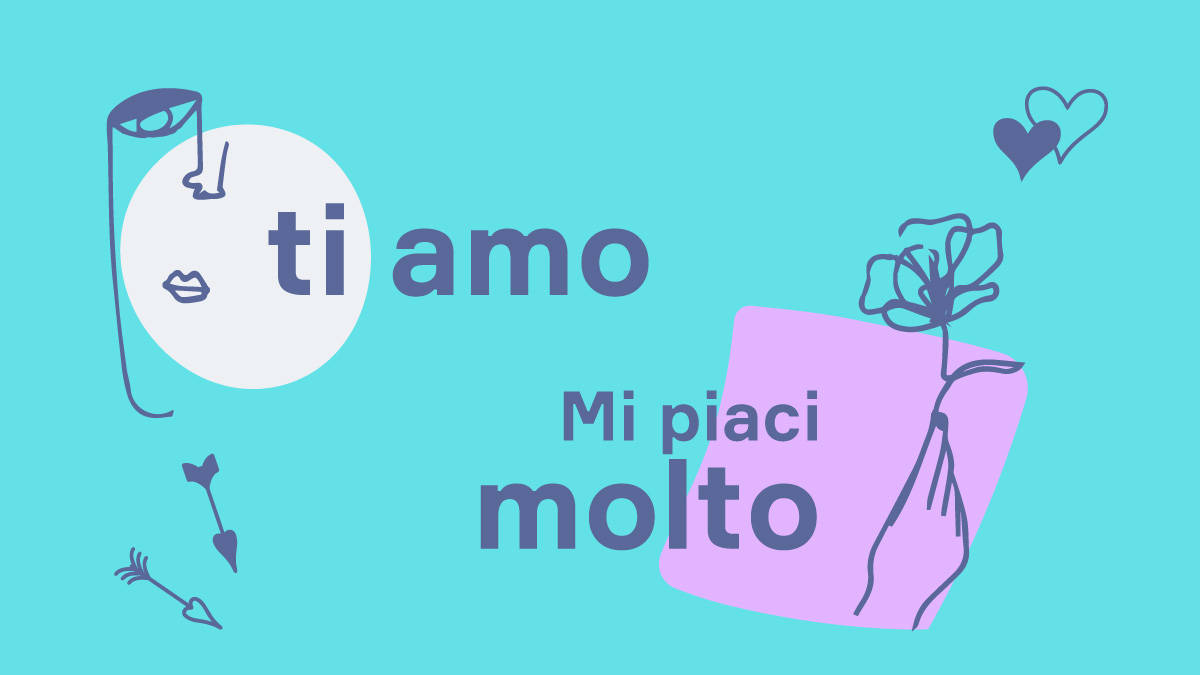As you study Italian online and fall in love with the beauty of the language, you may want to explore the romantic side of Italian culture.
Whether you’re partial to Dante’s unrequited love for Beatrice or the glitz and drama of Love Island Italia, you may be searching for the right words to woo and win your special someone. We’ll discover the Italian words and phrases that will help you write your own epic love story.
Romantic Ways to Say “I Love You” in Italian
From a no-frills “I love you” to more poetic variations, here are several ways to express your tender feelings in Italian.
It’s a safe bet that you’ll be using the tu form with these expressions, to informally address an individual you know fairly well.
English | Italian |
I love you (to a serious romantic interest) | ti amo |
I love you with all my heart | ti amo con tutto il mio cuore |
I desire you | ti desidero |
I will always love you | ti amerò per sempre |
I adore you | ti adoro |
I love you very much | ti amo tanto |
I love you more [as a direct reply to ti amo] | io di più [understood as io ti amo di più] |
I’m in love with you | sono innamorato di te [spoken by a man]; sono inamorata di te [spoken by a woman] |
Regarding ti amo and its variations, you would reserve it for serious, committed, romantic love.
To express love for a family member or close friend, use ti voglio bene. It essentially means “I want good things for you” in English. Ti voglio molto bene means you care very deeply.
Significhi molto per me (You mean a lot to me) can be used either romantically or platonically. To avoid a misunderstanding, put it in context.
- Romantic:
- Significhi molto per me e ti amerò per sempre. (You mean a lot to me and I will always [romantically] love you.)
- Fond, yet simply friendly:
- Significhi molto per me, come famiglia. (You mean a lot to me, like family).
- Significhi molto per me, come un caro amico. (You mean a lot to me, like a dear friend).

Start speaking Italian fluently, fast.
Baci e abbracci: Hugs and Kisses
When it comes to hugging and kissing, it’s important to be respectful of individual wishes, as well as Italian cultural expectations.
Friends in the same age group commonly share il bacio (the kiss) when they meet and part. It means a light – or air – kiss for each cheek, usually starting on the left side. Among good friends, il bacio is often accompanied by abbracci (hugs). It’s generally not used with new acquaintances, older people, or work colleagues.
If you’re uncertain, you can take your cue from the person you’re greeting. This is especially true if you’re a man greeting a woman, as it’s considered polite to let the woman set the tone and the standards for personal space.
Contrary to the casual affection expressed by a cheek kiss, going lip-to-lip indicates romantic intentions and intimacy.
General “Hugging and Kissing” Words
English | Italian |
a (big) hug | un (forte / grande) abbraccio |
a kiss | un bacio |
to kiss | baciare |
to hug | abbracciare |
to hug each other | abbracciarsi; scambiarsi un abbraccio |
to cuddle | farsi le coccole / coccolare |
Hug me | Abbracciami. |
Kiss me! | Baciami! / Dammi un bacio! [literally, “Give me a kiss!”] |

“Kisses and Hugs” for Emails and lettere d’amore (Italian Love Letters)
Here are a few sweet sign-offs you can use in your affectionate or romantic correspondence.
English | Italian |
a kiss and a hug | un bacio e un abbraccio |
a warm hug | un caro abbraccio |
kisses | baci |
kisses and hugs | baci e abbracci |
you’re always in my heart | sei sempre nel mio cuore |
with heaps of kisses | un sacco di baci [literally, “a sackful of kisses”] |
Pet names show affection in languages throughout the world. In Italian, we use vezzeggiativi (endearments) for love interests and family alike. Finding just the right endearment for the object of your affection can strengthen your bond.
- Tesoro – Treasure
- Tesorino – “Little Treasure”; sweetie; sweetheart
When you call someone il mio tesoro (my treasure), you’re showing their inestimable worth to you. It’s appropriate for a long-standing romantic relationship or a parent’s love for a child. You can also call someone un gioiello (a jewel).
Both tesoro and gioiello are nouns that always retain their masculine form, even if you’re telling a woman, Sei il mio tesoro (You are my treasure) or Sei un gioiello (You are a jewel).
Endearing adjectives like caro (dear) and piccolo (little one) will change to match the gender of the person they’re describing.
- Caro [masc.] / Cara [fem.] - Dear; Darling
If you use the possessive with this (for “my dear” or “my darling”), take care to say mio caro / mia cara. Caro mio (or cara mia) is a little sassy, like calling someone “Mister,” “Buster,” or “Missy” in English. For example:
Hai appena perso il tuo migliore amico, caro mio. – You’ve just lost your best friend, Buster.
Ti conviene fare la brava, cara mia. – You’d better watch it, Missy.
- Carissimo / Carissima – Dear [used with friends]
- Amore mio – My love
Even though it might sound somewhat romantic, amore mio (my love, or “love of mine”) can be used more casually, even with amici (friends) and bambini (kids). It’s a bit like “honey” or “hon” or “sweetie.”
- Mio amato / Mia amata – My beloved
- Piccolo / Piccola – Baby [literally, “little one”]
Piccolo / Piccola can be used in a flirty or romantic way. You can also address a small child with this word, in the same way we might say, “Hey, kiddo” in English.
- Principessa – Princess
- Dolcezza – Sweetness
Both Dolcezza and Principessa are endearments bestowed upon women.
- Amorino / Amorina – Little Love
- Innamorato / Innamorata – Lover
- Anima Gemella – Soulmate [literally, “Twin Soul”]
Italian “pet names” based on animal names are often used with children. These include Passerotto / Passerotta (Little Sparrow [usually for girls]), Scoiattolino / Scoiattolina (Chipmunk), Cucciolotto / Cucciolotta (Little Puppy), Gattino / Gattina (Little Cat), Coniglietto / Coniglietta (Little Bunny), Topolino / Topolina (Little Mouse), and Paperotto / Paperotta (Little Duckling).
You might also hear food-inspired endearments. Fragolina (Little Strawberry) is a nickname for females, whereas Caramellino (Caramel / Butterscotch) is often used for little boys.
While Patatino / Patatina (Little Potato / Potato Chip / French Fry) sounds innocent enough, it comes with a cautionary note: Beyond describing spuds, patatina can be used to refer to a very private part of a lady’s anatomy. As is often the case, the meaning is often determined by context and tone of voice.
Orsacchiotto (Teddy Bear) and Polpetta (Meatball) are sometimes used for men. Imagine hearing, Sei l’uomo della mia vita, Polpetta! (You’re the man of my life, Meatball!) from your lover. This is the stuff of dreams.

The fastest way
to learn Italian
Try Lingvist for free.
“I Miss You” in Italian
You can use these phrases to tell your loved one how their absence affects you.
English | Italian |
I miss you | mi manchi |
I think of you always | ti penso sempre |
I will miss you every day | mi mancherai ogni giorno |
I can’t live without you | non posso vivere senza di te |
Romantic Words for Dating in Italian
English | Italian |
to date [generally] | uscire con; uscire insieme |
to date [as a couple who is going out together, long-term] | frequentarsi |
a date | un appuntamento [can also mean a regular appointment] |
to court [to woo; to date with serious intentions] | corteggiare; fare la corte [somewhat old-fashioned, but still used]; fare il filo [literally, “to make the thread”] |
to flirt / to make a move | flirtare / provarci |
boyfriend / girlfriend | il ragazzo / la ragazza* |
companion [often cohabitating] | il mio compagno / la mia compagna |
romantic partner | il mio partner / la mia partner |
*Around Milan and other northern cities, il moroso and la morosa can be used to mean “boyfriend” and “girlfriend,” respectively.

Love and Marriage: The Basics
As it turns out, so-called “Italian Wedding Soup” has nothing to do with nuptials. But, take heart – the following words do:
English | Italian |
in love with | innamorato di / innamorata di / innamorati di / innamorate di |
to propose marriage | fare una proposta di matrimonio |
fiancé / fiancée [or very serious boyfriend / girlfriend, especially among older people] | il fidanzato / la fidanzata |
engagement | il fidanzamento |
engagement ring | l’anello di fidanzamento |
engagement party | la festa di fidanzamento |
to marry | sposare |
wedding day | il giorno delle nozze; il giorno del matrimonio |
bridesmaid | la damigella |
maid of honor | la damigella d’onore |
groomsman | l’amico dello sposo |
best man | il testimone dello sposo |
wedding ceremony | la cerimonia di matrimonio / la cerimonia di nozze / la cerimonia nuziale |
wedding ring | fede nuziale (or just fede) |
bride | la sposa |
wedding vows | le promesse di matrimonio / le promesse nuziali |
groom | lo sposo |
wedding cake | la torta nuziale |
wedding dress | l’abito da sposa; l’abito nuziale |
tuxedo | lo smoking |
marriage | il matrimonio |
husband | il marito |
wife | la moglie |
wedding anniversary | l’anniversario di matrimonio |
Italian Love Phrases
There are numerous phrases you can use to express different degrees of romantic feelings.
- Mi piaci molto. / Mi piaci tanto.* – I like you a lot.
You can use this phrase to express the start of a romantic interest in someone, without going overboard and scaring them off. It can ease you into a conversation about perhaps turning a friendship into a deeper, romantic relationship.
If you’re really uncertain about whether your feelings will be returned, you can start out even more simply, by just saying mi piaci (I like you). However, unless it’s paired with a qualifier, such as mi piace come canti (I like how you sing), saying mi piaci by itself still expresses romantic interest.
- Ho preso una sbandata per te. – I’m falling for you / I have a crush on you.
Una sbandata literally refers to a person drifting, a car skidding, or a ship listing to one side. While this may not sound very romantic, just think of it as “falling” for someone.
- Sono pazzo di te [said by a man] / Sono pazza di te [said by a woman] – I’m crazy about you.
- Vuoi diventare il mio ragazzo / la mia ragazza? – Do you want to be my boyfriend / my girlfriend?
- Sono qui davanti a te col cuore in mano. – I stand here before you with my heart in my hand.
Col cuore in mano (with heart in hand) shows your emotional vulnerability. This is when you put all of your cards on the table and open up about your feelings – no matter what the consequences.
Courting Romance: Italian Phrases for Flirting and Dating
Want to uscire (go out) with the person of your dreams? Here are a few phrases you can try to make those magical dates happen:
- Qual è il tuo numero di telefono? – What is your phone number?
- Sei libero stasera? [to a man] / Sei libera stasera? [to a woman] - Are you free tonight?
- Ti va di bere qualcosa insieme? – Do you want to get a drink together?
- Vuoi uscire a cena insieme? – Do you want to go to dinner together?
Other popular dating ideas include andare al cinema (going to the movies) and fare una passeggiate (taking a walk). Italian-style romance can mean sharing a moonlit Venetian gondola ride, visiting Tuscany’s fabled vineyards, or holding hands under Juliet’s balcony in Verona.
No matter where your romantic journeys take you, keep learning new Italian words so that you can eloquently and clearly express your deepest thoughts and feelings.
Romantic Italian Phrases Poster
Feel free to print it for your study area, or share it on your website or blog.


